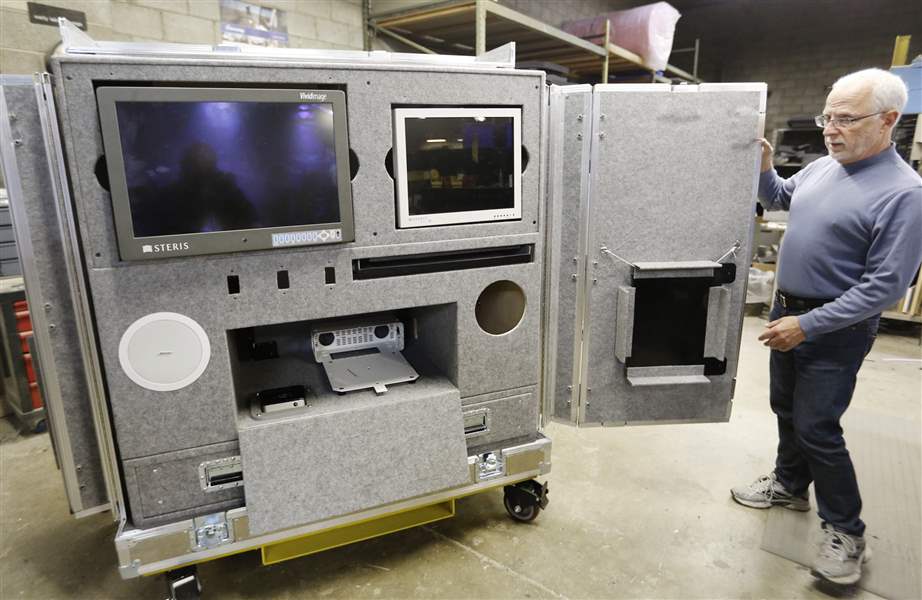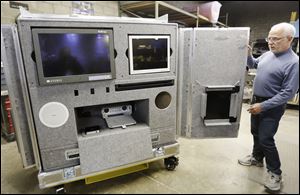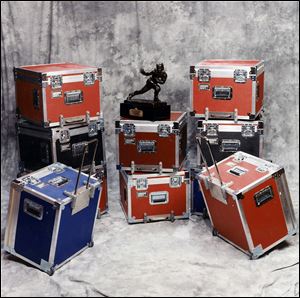
Columbus firm on the case for special orders
11/16/2013
Owner Steve Burkey of Cabbage Cases in Columbus shows off a case made for STERIS, a firm that makes medical equipment, to display high-tech equipment at trade shows.
COLUMBUS DISPATCH/FRED SQUILLANTE

Owner Steve Burkey of Cabbage Cases in Columbus shows off a case made for STERIS, a firm that makes medical equipment, to display high-tech equipment at trade shows.
COLUMBUS — Archie Griffin had an enviable problem. Almost everywhere he went, people wanted to see his two Heisman trophies.
The former Ohio State University football star needed to find a way to transport the awards safely, and he turned to a Columbus business: Cabbage Cases.
At that time — the early 1990s — the company produced cases mostly for musical instruments and audiovisual equipment. It leapt at the chance to help Mr. Griffin.
Word got around, and the company has sold more than 50 of the cases for other Heisman winners, including Tony Dorsett, Marcus Allen, and Robert Griffin III.
Cabbage Cases has many versions of this story: The small company has touched a series of high-profile people and events.
When you see a Grammy Award being presented, the trophy was delivered to the theater in a Cabbage case. In the National Football League, when the referee goes under the hood to see an instant replay, the outer shell of the equipment is a Cabbage case. The people who dress up as Brutus Buckeye, the Ohio State mascot, store the costume in a Cabbage case.
Steve Burkey started the company in his OSU campus-area garage in 1974. He lived in a house full of friends, many of whom were musicians.
“We were in a garage at the same time as Apple,” he said. “They just grew faster than us.”
He played piano and organ in several area bands. And yet, he wanted to find a steady gig outside music.
His initial plan was to build guitar amplifiers and speakers. He found that customers were much more interested in having him build heavy-duty cases for musical instruments.
When he went to register for a business license, his mind went blank when he had to come up with a name. The first thing that came to mind was “Cabbage Enterprises,” named after one of his defunct bands, Cabbage.
At first, the work force consisted of Mr. Burkey and the other co-founder, Rick Smith. Mr. Smith moved out of the region in 1976.
The company gradually added employees by hiring friends, or friends of friends. Early photos look like an Allman Brothers Band tour, with almost everyone sporting beards and long hair.
Today, the company has 26 workers — but not as much hair.
Mark Gardner was one of those employees. He is now vice president, directly overseeing the factory that has been the company’s home for about 20 years.
“You want [the cases] to be lightweight and strong, but it’s hard to do both at the same time,” Mr. Gardner said.

The Heisman trophy in this photo was won by OSU’s Vic Janowicz in 1950. Another Buckeye superstar, Archie Griffin, turned to Cabbage Cases so he could transport his two Heismans, won in 1974 and 1975.
The materials include plywood, metal, foam rubber, and ultrastrong plastic.
Employees have flexible hours. The early birds get there by 6 a.m., but some don’t arrive until four hours later. Most of the employees work about 45 hours per week.
In the 1990s, Mr. Burkey hired two Vietnamese refugees. He found the two men ranked among his best workers, and he has hired many of their friends and family members.
The company’s catalog has a few standard items, but most of its work is custom-made and spread among many customer bases. Its largest product category is cases for large audiovisual equipment, about 20 percent of sales. Among the other large segments are cases for costumes and for entertainment productions, each about 15 percent of sales.
Mr. Burkey estimates that about 20 companies in the United States make similar types of cases. Cabbage Cases is close to the middle in terms of size, he said.
One of the most-notable custom jobs was for Archie Griffin, who is now president of the OSU Alumni Association. He had seen the cases that football videographers use, and he thought they would be good for when he took one of his two Heisman trophies to speaking engagements.
“You don’t just walk around carrying it,” Mr. Griffin said, speaking from his office at OSU. “You need something to protect it.”
He took one of the trophies to Cabbage Cases to get it measured. The company built him a sturdy case, and he picked it up a week later.
But there was a problem. The case was too large to fit in the trunk of Mr. Griffin’s Oldsmobile. The company made him another case.
This unneeded case turned out to be an opportunity in disguise. Cabbage Cases mailed the larger case to the organization that presented the Heisman, the Downtown Athletic Club in New York, saying it was a gift.
The club used the case, and other Heisman winners saw it and wanted one.
Today, Mr. Griffin’s trophies are on long-term loan to the Ohio Union and the Buckeye Hall of Fame Grill, so he doesn’t need to lug them around.
Cabbage Cases’ offices do not sport a Heisman Trophy, but they do have a Grammy. The company supplied cases to hold the awards given out each year by the National Academy of Recording Arts and Sciences.
The manufacturer that makes the Grammy trophy bought the cases and gave Cabbage Cases a replica of a trophy.
Perhaps the most-visible use of the cases is by officials of the NFL.
The company made the outer shell of the instant-replay booths that referees use on the sidelines to review plays. In that instance, the company provided the materials to another case-maker, so the Cabbage Cases name is not on the product.
The enterprise that began in the long-hair days of the 1970s is evolving, and Mr. Burkey, 66, is gradually handing off responsibility to Mr. Gardner.
“I would like to transition out and have it survive me,” Mr. Burkey said.
He expects demand to grow for his products, as more functions are handled by portable electronics. But he knows from experience that the business will evolve in ways that he cannot predict.